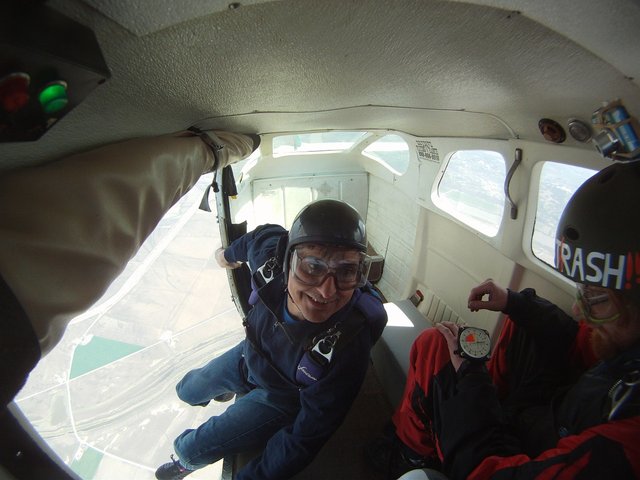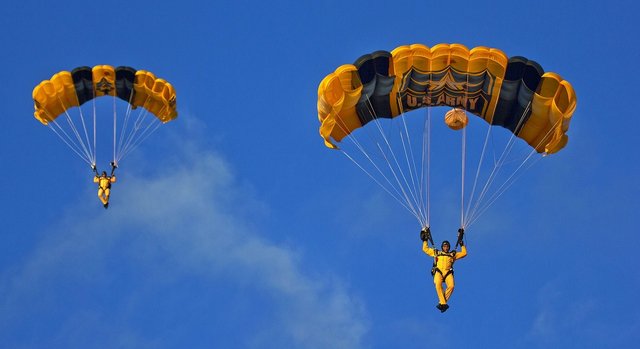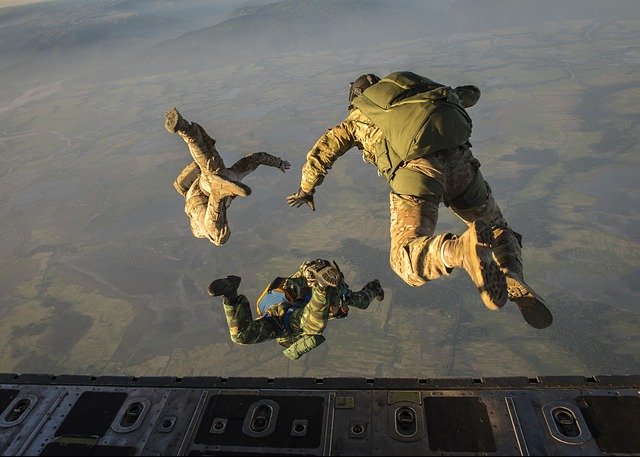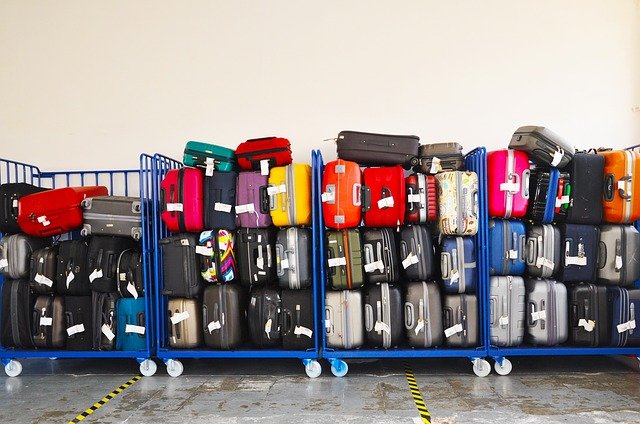Can we have safer commercial air travel if parachutes are present?
Air travel is the fastest means of transportation. Some commercial jetliner can travel at speeds more than 955 kilometres per hour or 593 mph. Until Elon Musk or the other firms perfects the Hyperloop (a train hurtling through vacuum tunnels at speeds of about 1,220 km/h or 760 miles per hour), commercial air travel still holds the undisputed record of the fastest means of transportation.
But some develop an extreme fear of flying and goes through severe anxiety and fear once they are on a flight. Maybe such person may have some level of assurance in the numbers shown below. The odds of dying on a plane is one in 7.36 million. This safety chance translates to flying for more than 20,000 years (if you fly every day) before being a victim of the fatal flight accident. The odds are even higher than someone getting hit by lightning in a year- an unlikely event put at 1 in 960,000.

[image credits: Pixabay Commons]
Interesting enough, such no fliers love taking the road to their destination. A survey shows in 1990, more than four sixty-four million people made an air journey in the United States of America. Out of this number only 770 fatalities occurred. On the other hand, in the same year, the road traffic board announced a total of 44,599 deaths via road accidents involving 59,292 vehicles.
If that was not reassuring enough, 2017 even made a record with zero fatalities recorded in the commercial aviation cycle.
Even with all these statistics, some still develop a phobia of flying (aviophobia) amongst these reassuring statistics. This fear becomes real if the person happens to encounter turbulence such as this described by a reporter which shook the plane "like a junkie shakes her baby."
Or the terrifying incident on January 30, 2016, when a British Airways 747 aeroplane en route to Chicago developed a landing gear problem and had to return to the London airport to disembark the 300 passengers and crew member onboard. It was a harrowing experience for the passengers as the plane jettisoned the fuel as a precaution to reduce the landing weight of the aircraft. A plane's body may disintegrate due to the extra weight from the fuel meant to have been burnt before landing, as there are still hours left for the journey when the pilot realised there was an anomaly in the landing gear and decided the best way was to return.
We have all watched that action movie where the hero or villain ditches the plane as it is about to crash and jumps to freedom wearing a parachute. This is not only limited to Hollywood action blockbuster movie, in real life, but military pilots have also been known to jettisson their jets some few seconds before impact.

[image credits: Pixabay Commons]
If this is obtainable, why don't flights from commercial aeroplanes have packs of parachutes so that passengers can jump off the flight when it's sure the plane is either going to do a dangerous crash landing or a helpless fatal dash to earth? Can we make flights safer to fly with the introduction of parachutes in a similar vein that cruise ship like the Carnival Fantasy with a capacity of 2056 passengers plus 920 crew has enough life-saving appliances (with includes personal floatation devices, life rafts, etc.) for 4,470 people? The number far surpasses the number of people the cruise ship will ever have to accommodate.
The military jet always comes with multiple parachutes which can be used in the event of emergencies. But these jets only carry fewer passengers when you compare it with the commercial aeroplanes. So every safety conscious person may be wondering why the commercial airliners lacked the parachutes like the military jets.

[image credits: Pixabay Commons]
There is an old joke about skydiving from an American comic Steven Wright which says, "If at first, you don't succeed, then skydiving definitely isn't for you." The business of jumping off an aircraft is a serious one for highly trained professionals as a mistake could be fatal. The military is trained professionals and can jump off a plane that is about to crash. The everyday flier does not possess such skill; even if there are parachutes onboard, there would be nothing but mass suicides for the majority of the passengers were they allowed to jump off.
There is the science against such activities; there is the height at which you can safely jump off an aeroplane. In most air mishaps, the danger is always between two points- taking off and landing. The risk is still at its barest minimum during flight. The commercial airliners fly at between 33,000 to 42,000 feet. Remember the oxygen content of the atmosphere decreases with increase in altitude. Hence the reason that rockets carry oxygen to facilitate combustion at high altitudes. If a commercial aeroplane is to open its doors at that height, a would-be jumper will be unconscious as hypoxia sets in. You may wake up with some seconds to hit the ground.
Skydivers do their jump at an altitude of between 10,000 and 15,000 feet; it is preplanned, so pilots move at almost stall speeds and skydivers dress up in clothes that do not flap. You really do not want to that person that jumps off a plane wearing a babariga.
As there is a danger associated with jumping off an aeroplane at high altitude, there is also a danger of jumping off at a low height. It takes an average of 600 to 1600 feet for a parachute to safely deploy. Even the faster sports parachute takes up between 400 to 800 feet to open. That means there is an increased risk of splattering on the ground if you are you jump off an aircraft at below 2000 feet.

[image credits: Pixabay Commons]
There is the issue of weight, the average weight of carry-on luggage which is exempt from luggage fees is 50 pounds (approximately 23kg) for most international airliners. There is a charge of extra $50 and more for extra luggage. Why is that so? The more weight a plane carries, the more fuel it burns. The aviation fuel is expensive, and every pound of extra load involves more fuel use.
The total assembly weight of a parachute can weigh up to 37 Ibs (16.7 kg) and can cost about $4500 for the low budget accessories plus equipment and up to $5900 to $9000 for the premium packages including helmet, altimeter, jumpsuit, goggles, etc. The aircraft is a commercial enterprise out to make a profit, seeing that procuring all these will cost money and may likely end up being of no use to the passengers-they do not have it.
The panic alone if a commercial airline opens its doors midflight is alone to cause more casualty than may occur in the event of the crash landing.
With all these odds stacked against the commercial aeroplane on use of parachutes, a Ukrainian aviation engineer Vladimir Tatarenko Nikolaevich conceptualised a detachable aircraft which will have the lower half of the plane where passengers are detached and float downwards with the help of a parachute. The underside housing the passengers will have an inflatable device that cushions the landing and also acts as a flotation device in the event it fells on water.
He is looking for investors to kickstart his idea with critics thinking the $100 million to $350 million already spent on each aircraft maintenance annually by airlines is already enough. That money for the project is better off tackling diseases of the heart which kills about 610,000 people every year in the US.
References
- Hyperloop
- How safe is commerical flying?
- Number of deaths, crashes and motor vehicles in fatal crashes, 1975-2016
- MIT Skydiving
- Climbing full, Landing Empty:The Role Of Jump Pilots In Skydiving
- Why Don't Commercial Vehicles Have Parachutes for Passengers?
- Could this detachable plane cabin really save lives?
If you write STEM (Science, Technology, Engineering, and Mathematics) related posts, consider joining #steemSTEM on discord here. If from Nigeria, there may be need to include the #stemng tag in your post. You can visit this blog by @stemng for more details. You can also check this blog post by @steemstem here and this guidelines here for help on how to be a member of @steemstem. Please also check this blog post from @steemstem on proper use of images devoid of copyright issues here
Would you like to delegate to the @steemstem? Here is a link below
50 SP | 100SP | 500SP | 1,000SP | 5,000SP | 10,000SP | 50,000SP

It may not be too feasible to include individual parachutes on a commercial airline.
But think of this; the entire airplane can have a single super large parachute that would be rocket-propelled and can be deployed in seconds if anything happens.
It's been used in smaller planes before now; but maybe it can also be used in bigger airplanes.
I saw a vid on that
Yes, this works for small planes. The Ukrainian engineer that I mentioned is looking into how to deploy such a parachute for big commercial aeroplanes.
So much to chew in this post though. Humor and facts intertwined.
There's no way hundreds of people will jump from a descending air craft, it's just so funny as it looks. Aside the phobia (which definitely will play a big role), we probably will expect them to drop at intervals, at least, one person at a time. so, considering the speed with which the air plane will be descending, probably just a small percentage of them will be able to jump before the minimum altitude allowable for a safe landing is reached.
Also, cost as you mention will be a big constraint considering the big odds of a possible crash. Nobody willl ever want to spend that much one parachutes just to except a crash whose probability of occurrence is so tiny. I ll rather build hostels in all Nigerian tertiary institutions and await alerts from house rents!
I've learned a lot here:
The facts too - O lit!
The detachable aircraft will really be cool
Nice knowing we are thinking in the same way, I'm working on something related
Thanks for the compliment, we all try to make science great again :)
Yeah...this seems like a hell of a lot of trouble to solve a merely perceived but not actual problem. Of course, being afraid of flying I havw most certainly wished for a parachute while in the air.
Me too, even when I know I have virtually no idea of how to use one :)
Oh yeah it would be a complete shitshow if I needed to use one in an emergency and id probably die anyway
@greenrun, Parachutes will not make the planes safer to my opinion because people will out of fear still not know what to do when it becomes an option to jump off a plane.
But I think flights are safer because you don't find teenagers and drunks flying all the time like you see with cars.
That's very true, it's hard to get a drunk pilot :)
I agree that parachutes on a civilian plane is a bad idea but it would be the funniest sight to see dozens of fat, out of shape people dropping out of the sky under their chutes.
Haha... I was imagining what you are saying. The free fall will be awkward and ridiculous.
That will be a sight only to be seen on a Hollywood comedy movie :D
Okay this is the funniest thing I've read this night.
But on a more serious note, parachutes are not as straightforward as made us to believe in movies. I'm glad this post has addressed that. Nice work @greenrun
You really don't want to be that person that took the jump that didn't succeed :)
Hello @greenrun
With numerous comparative statistics between air travel and land travel, I believe this piece will certainly cure the phobia many people have against taking air travel.
It is interesting to find out the numerous reasons why parachutes are not used in commercial airlines as against military air jets. I have tried to figure out this for sometimes to no avail, though no serious efforts was made in this regard but have certainly entertained the thoughts before. Glad I now know reasons for this mystery, thanks to this article.
The money is too much for this project, and should be directed to something more far reaching. I think the quoted text is best response for Mr Nikolaevich😂😂😂
Regards
@eurogee of @euronation and @steemstem communities
We need to make some tough decision and set our priorities right.
Exactly!
Parachutes are used for emergency landing. So I believe we can have a safer commercial air travel if parachutes are present.
Just imagine a commercial airline having no parachutes in case of an accident . Perhaps as a result of an anomaly. What happens to the passengers?
The passengers who are not trained in the use of parachutes stands little or no chance of survival with one. So I think it's better to sit tight and hope the aeroplane did not end up in a fatal crash.
Another interesting post. It is true that Air travel for now is safer than roads but remains the most untrusted, one of the reasons I think is because people don't really know much about it and the airline companies don't really see it as their duty to sensitive the public on their fears.
If given the rate of fatalities per traveller, I doubt it'd come up in the list of "most untrusted" means of transportation.
Well maybe abroad but here in Nigeria, aside from it being expensive alot of people believe road to be safer.
Having parachutes on commercial airline seems like a better option. But it is one thing to jump off an airplane, it's another thing landing safely. This technical know how makes using parachutes on commercial airline a difficult option
If you understand the post, you'd realise a parachute may not make much of a difference in a commercial flight filled with untrained sky divers and unfavourable unplanned jump condition which is mostly the case of an air crash incident.